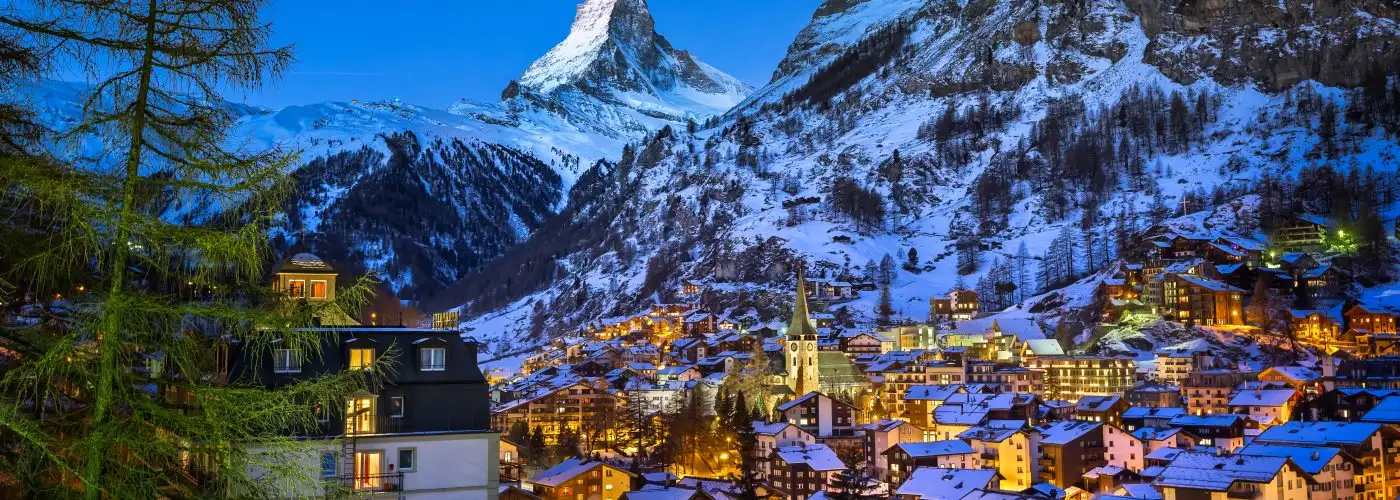Don’t plan a trip to Switzerland without reading these Switzerland travel tips first. You’ll save money and have a better time!
Invest in a Swiss Travel Pass
Switzerland is easy to get around, thanks to an impeccably run transit system that includes everything from boats to trains and cable cars. If you plan on traveling between cities, as well as utilizing intra-city transportation (like city buses), get a Swiss Travel Pass that covers unlimited travel “throughout the rail, bus and boat Swiss Travel System network.” It also offers 50 percent off most mountain railways and cable cars.
Not only will you save money on travel, but the Swiss Travel Pass also gets you free entrance to 500 museums and exhibitions.
Don’t Take Taxis
Swiss public transportation is easy to navigate, with well-marked signage for routes and countdown clocks that let you know when your bus will arrive. Most cities and towns in Switzerland are walkable as well. If you want to save money, avoid taxis, though, as you may be shocked—even for a short ride—at the exorbitant cost. In fact, a recent survey by Carspring found that the taxis in Zurich are the most expensive in the world, at an average of $5.19 per kilometer. So, not taking a taxi is one of the best money saving Switzerland travel tips.
Mind the Altitude
Headed to the Swiss Alps? Thanks to the great network of cable cars, trains, and gondolas, it’s easy to get up to high altitudes quickly. Make sure you bring sunscreen with you, as you’ll get a sunburn faster at higher altitudes. Don’t push yourself too hard if you’re hiking, and take breaks if you feel lightheaded or dizzy—even if you’re just walking around a viewing platform. Be sure to drink lots of water, as that can help with some of the effects. Learn more about altitude sickness.
Don’t Buy Water
Purchasing bottled water from the supermarket in Switzerland is a total waste of your money, as the country is home to some of the world’s cleanest and best-tasting tap water. (In fact, in some places, you can even drink straight from a lake with no ill effects, but I don’t advise testing that on your trip if you’re not familiar with the area.) You can drink from any tap or one of the numerous free-flowing fountains you’ll find in every town, city, and sometimes even along mountain trails. Unless there’s a sign advising that the water is not potable (like you’ll see in train bathrooms), feel safe to drink for free and skip the bottled water.
Don’t Buy Tourist Chocolate
Souvenir shops and airport kiosks display mouth-watering assortments of Swiss-branded chocolates. Use your willpower to walk straight past those and into the nearest supermarket, where you’ll find entire aisles of equally great (or better) quality chocolate that the locals eat—at less than half the price.
Check Out Less Touristic Spots
Famous spots like Lausanne and Zurich get packed with tourists in the peak season, so if you’re adventurous and don’t mind getting off the beaten path, you’ll be rewarded with a cheaper and less crowded vacation experience. Try lesser-known towns of Biel, Solothurn, and Thun in the summer—you’ll likely never have to deal with crowds or lines.
Take Out Minimal Cash
Although it’s surrounded by EU countries, Switzerland is not part of the European Union. Since the country has its own currency, the Swiss Franc (CHF), it’s a good idea to take out out a small amount of cash when you arrive to use for emergencies (like when you want to buy ice-cream from a cash-only street vendor) and use your credit card (assuming it doesn’t charge a foreign exchange fee) everywhere else. This way, you won’t get stuck with a bunch of leftover CHF at the end of your trip.
Also note, that some places in Switzerland (but not all) will accept Euros, but they will likely give you your change in CHF.
Learn Which Language is Spoken
Normally, it’s pretty clear ahead of time what language is spoken in a country. Not so much in Switzerland, which has four official languages—German, French, Italian and Romansh. This can make it pretty confusing when deciding how to greet a local. As a general rule, Swiss-German is a safe bet, as it’s the most popular language in Switzerland, with 19 of the country’s cantons, or districts, being Swiss-German speaking. And many people speak English, so you shouldn’t have much trouble communicating.
Watch Out for Closing Times
Hoping to do some souvenir shopping or pick up groceries for a picnic dinner? Keep an eye on closing times. Particularly in the smaller towns, many shops close for lunch from noon until 2 pm, and then close fairly early, at around 5 pm. On Sundays and Mondays, many shops are closed all day.
More from SmarterTravel:
- Tipping in Switzerland: The Switzerland Tipping Guide
- Switzerland Travel Guide: What to Do in Switzerland
- 10 Ways to See Switzerland Like a Prince or a Pauper
[viator_tour destination=”69″]
Caroline Morse was hosted by Switzerland Tourism. Check out their website for lots of great Switzerland travel tips, and be sure to follow Caroline on Instagram @TravelWithCaroline for more photos or to share your Switzerland travel tips!
We hand-pick everything we recommend and select items through testing and reviews. Some products are sent to us free of charge with no incentive to offer a favorable review. We offer our unbiased opinions and do not accept compensation to review products. All items are in stock and prices are accurate at the time of publication. If you buy something through our links, we may earn a commission.
Related
Top Fares From
Today's Top Travel Deals
Brought to you by ShermansTravel
France: 8-Night Paris, Avignon & Nice...
Infinity Worldwide Vacations
 vacation
$2880+
vacation
$2880+
Poconos: 3 Nts in Garden of...
ResortsAndLodges.com
 hotel
$305+
hotel
$305+
7-Nt Canada & New England Cruise,...
Princess Cruises
 cruise
$839+
cruise
$839+




